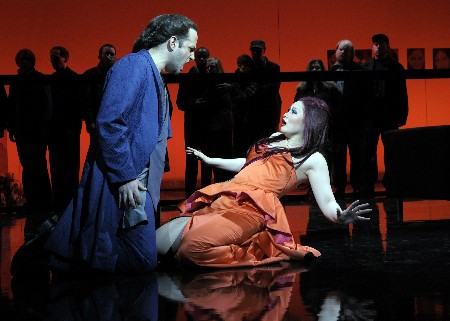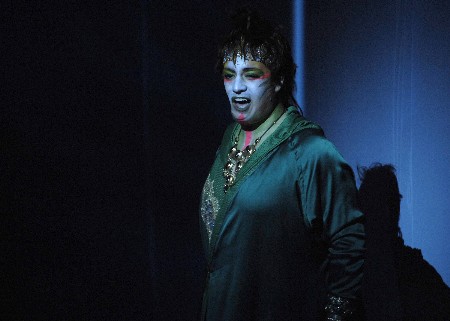Opera Review: ‘Madame White Snake’
Reviewed By Caldwell Titcomb

Opera Boston's 'Madame White Snake': Peter Tantsits as Xu Xian and Ying Huang as Madame White Snake Photo: Clive Grainger
It has been many years since a major new opera was mounted here. But Opera Boston has done just that with its recent world premiere of “Madame White Snake” at the Cutler Majestic Theatre. This was the most demanding and expensive undertaking in the company’s history.
The work itself is based on a celebrated ancient Chinese legend that has undergone some changes over the centuries. The libretto—her first—is by Cerise Lim Jacobs, born into a Chinese family in Singapore but educated in the U.S. and now a retired lawyer in the Boston area.
The composer is Zhou Long (like Jacobs, born in 1953), who grew up in Beijing, was forced to give up the piano and drive a tractor for five years under the Cultural Revolution, and eventually came to study at Columbia University, where he earned a Doctor of Musical Arts degree in 1993 and became a U.S. citizen in 1999.
According to the legend, a white snake demon is turned by the gods into a beautiful young woman whose companion (and the opera’s narrator) is a green snake (Xiao Qing). She falls in love with a young mortal man (Xu Xian) and, violating several taboos, somehow becomes pregnant. A Buddhist abbot (Fahai) sees through her disguise, and her lover betrays her with a potion, whereupon she is turned back into a snake.
The libretto has its share of trite lines but is certainly serviceable and exhibits some appealing alliterations (“the thunder of water and war,” “the death of doubt”). A prologue and epilogue (both involving a destructive flood) frame four continuous acts that reflect the four seasons: awakening, passion, decay, and betrayal.
Zhou’s score turns out to be quite strong, moderately dissonant but also infused with the pentatonicism of traditional Chinese music. He writes effectively for the four solo vocalists and the two choruses (16 villagers, 32 spirits of drowned children). The autumn and winter sections are particularly eloquent, the former exhibiting a wonderful duet. Zhou’s 33-person orchestra contains the standard western instrumentarium. But he also includes parts for Chinese percussion, a bamboo and clay flute, and the erh-hu (a two-string, bowed spike fiddle held on the thigh).

Michael Maniaci as Xiao Qing Photo: Clive Grainger
In the title role was soprano Ying Huang, a graduate of the Shanghai Conservatory of Music and a specialist in Mozart. She proved to have a lovely lyric voice, and her acting was convincing throughout. As her lover Xu Xian, Peter Tantsits, who holds degrees from Oberlin and Yale, displayed an admirable tenor. Dong-Jian Gong, with experience in both Chinese and western repertory, brought a fine bass to the role of the Abbot.
The role of Xiao Qing was entrusted to male soprano Michael Maniaci, who was trained at the Cincinnati Conservatory of Music and the Juilliard School, and he has embraced both standard works and premieres. The assignment of this female role to a countertenor harks back to the longstanding Chinese practice of having men play women. The prime example is the half-century career of Mei Lan-Fang (1894–1961), widely considered the 20th-century’s greatest Chinese actor, whose Beijing Opera repertory, as it happens, included the role of Madame White Snake in one of the tale’s incarnations.
The Boston Children’s Chorus (prepared by Anthony Trecek-King) and the adult villagers had quite a lot to do and did it well indeed. Gil Rose conducted the orchestra with his usual precision. Robert Woodruff, former artistic director of the American Repertory Theater, staged the production forcefully with only a modest amount of activity. David Zinn was responsible for the scenic and costume design. Mark Barton bathed the stage in varying light depending on the season, and Peter Nigrini devised the occasional videos projected on a scrim.
This co-commission will travel in October to the Beijing Music Festival, the largest music-producing organization in China, and one dedicated to fostering the works of new composers, both western and Chinese.
Tagged: Beijing Music Festival, Caldwell-Titcomb, Chinese, Cutler Majestic Theatre, Madame White Snake, Opera Boston, Robert Woodruf

I would like to send my congratulations to Cerise Jacobs. I met her on a trip, perhaps a World Leaders Symposium, but I don’t remember the year or the cruise. She told me about writing the libretto for Madame White Snake, but I don’t remember whether she had found the composer yet or was looking for one. I was delighted to learn that her dream had reached fruition. What a birthday present for her husband!